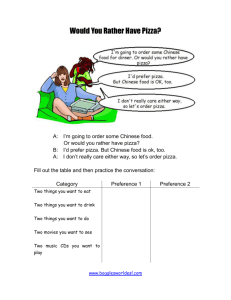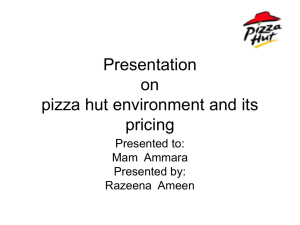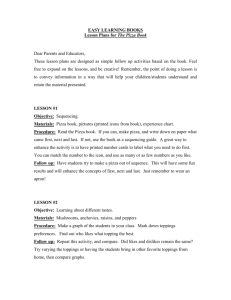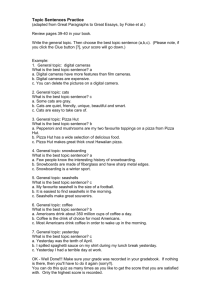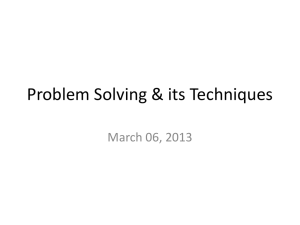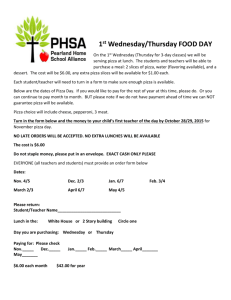Company Price Range (Rs) Domino's 39-265 PizzaHut 75
advertisement
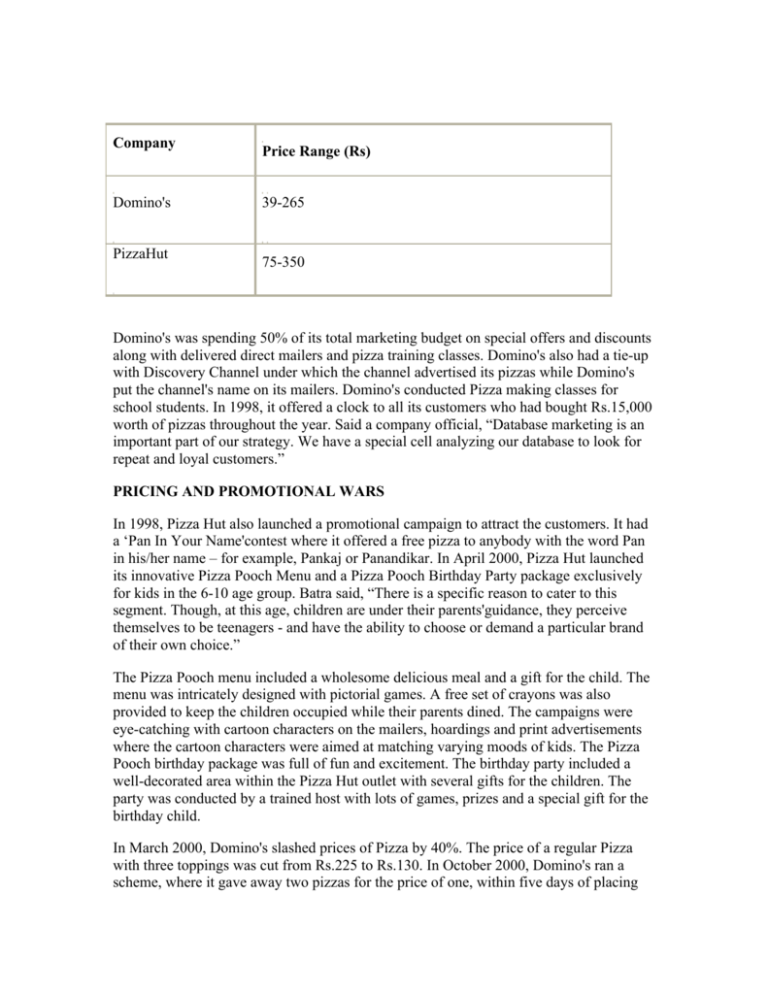
Company Domino's PizzaHut Price Range (Rs) 39-265 75-350 Domino's was spending 50% of its total marketing budget on special offers and discounts along with delivered direct mailers and pizza training classes. Domino's also had a tie-up with Discovery Channel under which the channel advertised its pizzas while Domino's put the channel's name on its mailers. Domino's conducted Pizza making classes for school students. In 1998, it offered a clock to all its customers who had bought Rs.15,000 worth of pizzas throughout the year. Said a company official, “Database marketing is an important part of our strategy. We have a special cell analyzing our database to look for repeat and loyal customers.” PRICING AND PROMOTIONAL WARS In 1998, Pizza Hut also launched a promotional campaign to attract the customers. It had a ‘Pan In Your Name'contest where it offered a free pizza to anybody with the word Pan in his/her name – for example, Pankaj or Panandikar. In April 2000, Pizza Hut launched its innovative Pizza Pooch Menu and a Pizza Pooch Birthday Party package exclusively for kids in the 6-10 age group. Batra said, “There is a specific reason to cater to this segment. Though, at this age, children are under their parents'guidance, they perceive themselves to be teenagers - and have the ability to choose or demand a particular brand of their own choice.” The Pizza Pooch menu included a wholesome delicious meal and a gift for the child. The menu was intricately designed with pictorial games. A free set of crayons was also provided to keep the children occupied while their parents dined. The campaigns were eye-catching with cartoon characters on the mailers, hoardings and print advertisements where the cartoon characters were aimed at matching varying moods of kids. The Pizza Pooch birthday package was full of fun and excitement. The birthday party included a well-decorated area within the Pizza Hut outlet with several gifts for the children. The party was conducted by a trained host with lots of games, prizes and a special gift for the birthday child. In March 2000, Domino's slashed prices of Pizza by 40%. The price of a regular Pizza with three toppings was cut from Rs.225 to Rs.130. In October 2000, Domino's ran a scheme, where it gave away two pizzas for the price of one, within five days of placing an order. During the same time, Pizza Hut launched a ‘one rupee pan deal' scheme. Under the scheme, for every pan Pizza Company Price Range (Rs) Domino's 39-265 PizzaHut 75-350 purchased, another was given away for Re.1. In November 2000, Pizza Hut introduced a scheme called ‘barah nahin to tera (if not served in 12 minutes, it is yours free)'. The scheme offered a speed lunch in 12 minutes for Rs.89. One second over 12 minutes guaranteesd that the customer would get it for free. Domino's supply chain management enabled it to cut costs. In late 2000, it revamped its entire supply chain operations (Refer Exhibit I). This enabled Domino's to slash prices. For instance, the price for a no-frills cheese pizza was down from Rs.75 to Rs.49. A 10” pizza with at least three toppings was available for Rs.119 as against the earlier price of Rs.225. BRAND BUILDING THROUGH ADVERTISING Domino's and Pizza Hut initially restricted their ad strategy to banners, hoardings and specific promotions. In August 2000, Domino's launched the ‘Hungry Kya? (Are You Hungry)'sequence of advertisements on television. A company official said, “We realized that a Pizza couldn't be slotted – it could be a snack; then again, it could also be a complete meal” The only definitive common link between Domino's Pizzas and eating was the hunger platform. The launch of ‘Hungry Kya?'campaign coincided with Domino's tie-up with Mahanagar Telephones Nigam Ltd. (MTNL) for the ‘Hunger Helpline'. The helpline enabled the customers to dial a toll-free number (1600-111-123) from any place in India. The number automatically hunted out the nearest Domino's outlet from the place where the call was made and connected the customer for placing the order. The number also helped Domino's to add the customer's name, address and phone number to its database. This was followed by Pizza Hut's first campaign on television in July 2001, which said, ‘Good times start with great pizzas.'The ad was aired during all the important programs on Star Plus, Sony, Sony Max, Star Movies, HBO, AXN, and MTV. Pizza Hut planned to spend between Rs.70-75 million on the ad campaign in 2001. Said Pankaj Batra, “The first ad campaign on TV defines Pizza Hut as a brand, and what it offers to its existing and potential customers. Once the awareness of this message is high, we will focus on other facets of the brand and its offerings.” GOING PLACES (LITERALLY) By March 2000, Domino's opened 37 outlets all over India. Between April 2000 and February 2001, Domino's set up 64 more outlets in India. Delhi had the maximum number of outlets – 17, followed by Mumbai with 13. Domino's had the largest retail network in the fast food segment in India- with 101 outlets across 40 cities. Domino's had a tie-up with a real estate consultant Richard Ellis to help with locations, conduct feasibility studies, and manage the construction. It was also looking at nontraditional outlets like large corporate offices, railway stations, cinema halls and university campuses. In early 2000, Domino's had opened an outlet at Infosys, Bangalore, which was very successful. It also had outlets at cinema halls – PVR in Delhi, Rex in Bangalore, and New Empire in Kolkata. By January 2001, Pizza Hut had 19 outlets across India. In a move to expand further, Pizza Hut planned to open an additional five restaurants in Mumbai and 30 restaurants across major cities in India, by 2001 end. Tricon announced that the company would invest Rs.30 million on each of the restaurants. In March 2001, Pizza Hut opened its first three-storeyed 125-seater dine-in restaurant at Juhu in Mumbai. Said a company official, “We are expanding the number of restaurants across the major cities to cater to today's youth which has taken to pizzas as a cuisine.” QUESTIONS FOR DISCUSSION 1. Domino's entered India at a time when Pizza Hut and McDonald's were already in the market. What was the strategy adopted by Domino's to make a dent in the Indian market? 2. ‘Database Marketing was an important part of the strategy in the Pizza Industry.'. Give Comments. 3. Though Pizza Hut entered India before Domino's, it eventually lost its share to Domino's. How can Pizza Hut counter the competition from Domino's?

